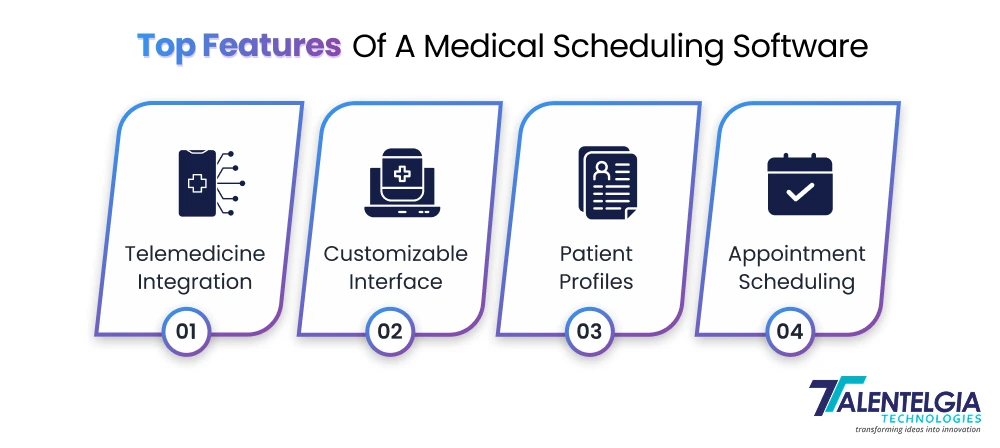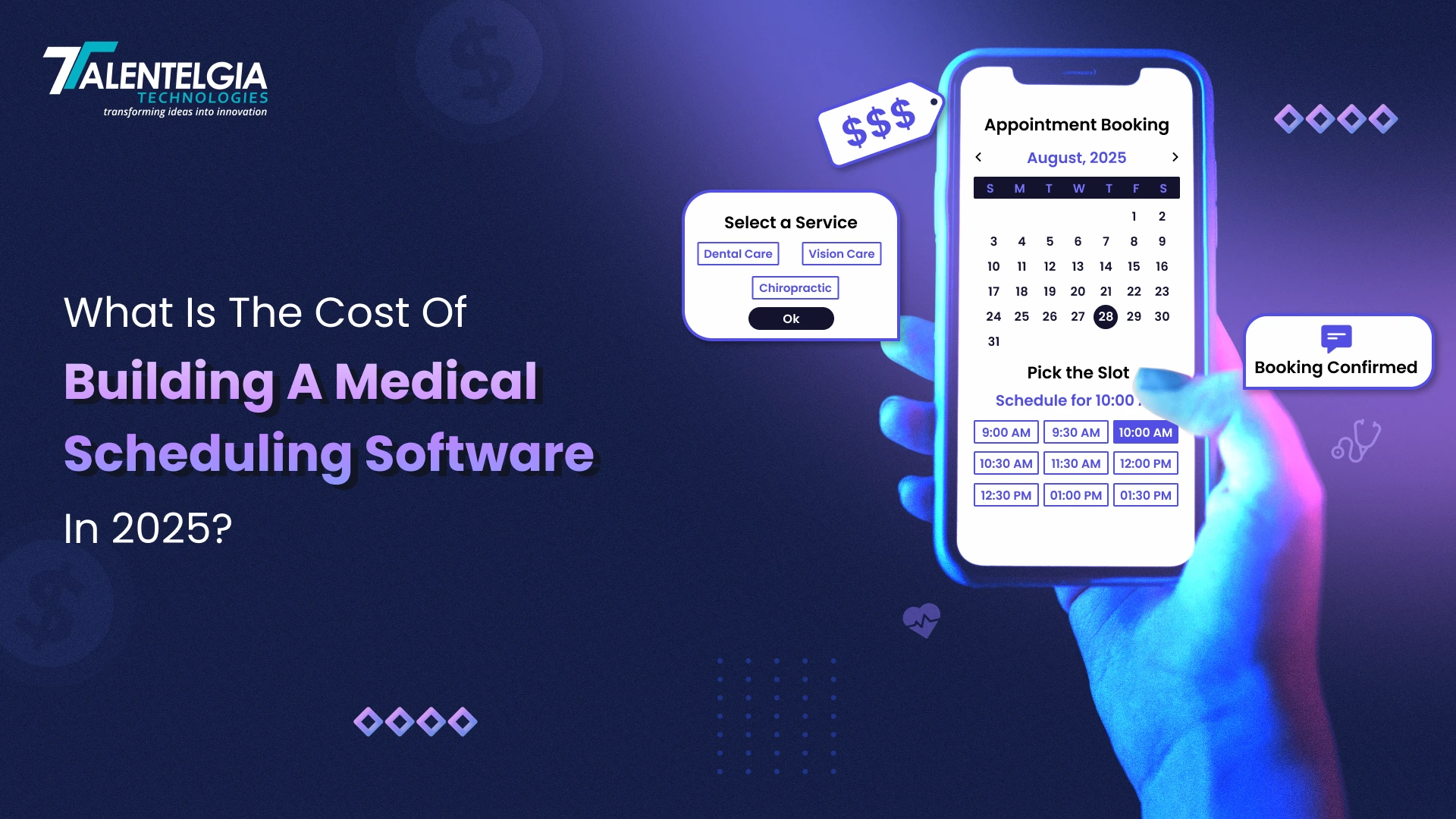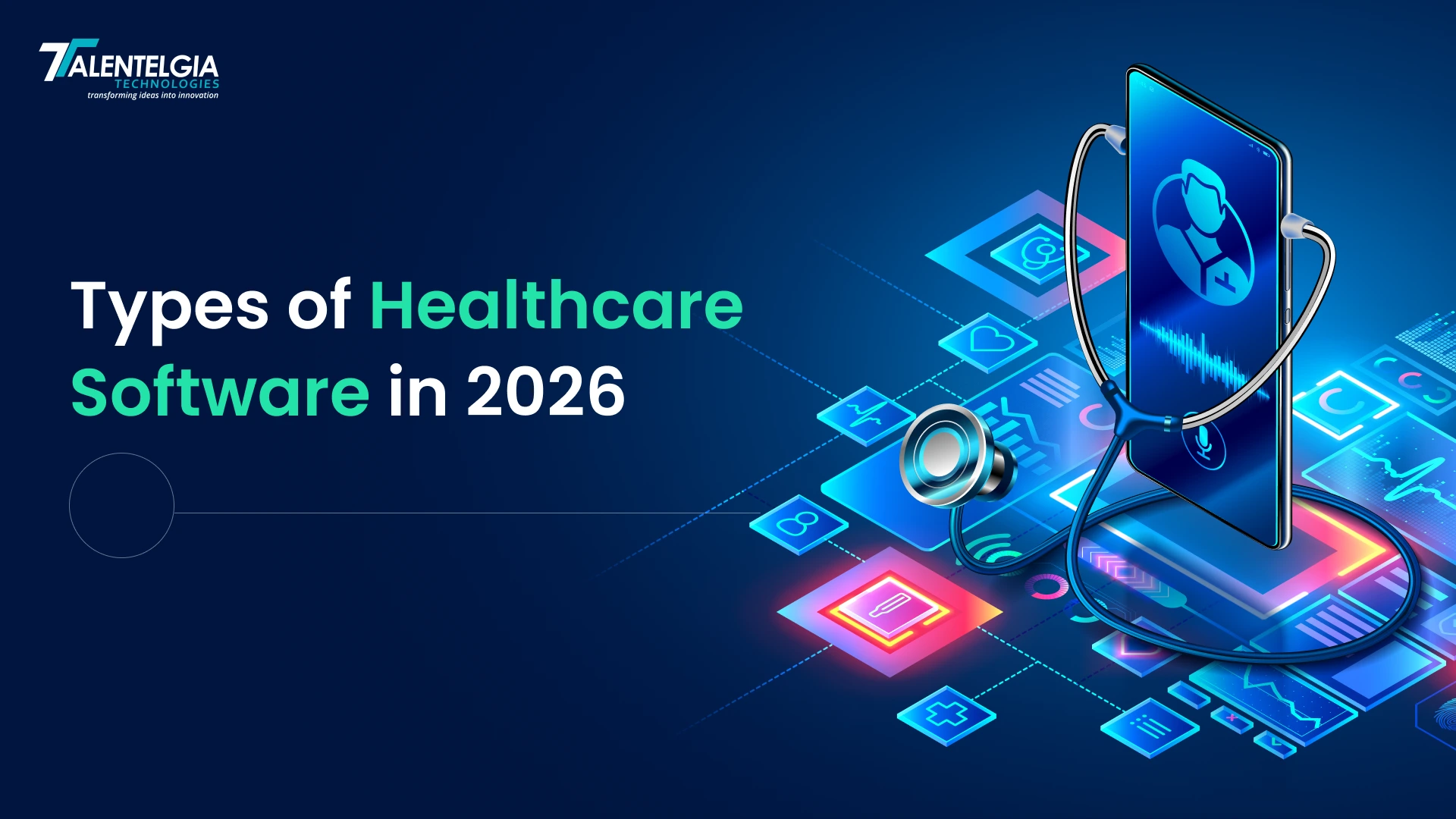Creating medical scheduling software has gone from being just another operational convenience to becoming almost a requisite for providers seeking to enhance the operations and care of their patients. Whether it is the idea of reducing no-shows for appointments or handling the calendar of multiple practitioners, a good scheduling tool can completely change the way hospitals and clinics are run. However, before getting started with development, the most critical question that comes to mind is ‘What is the cost of building medical software?’
Below is a comprehensive guide detailing the various aspects of building medical scheduling software, including basic functionalities and integrations, legal compliance, and development methodologies.
What Is A Medical Scheduling Software?
Healthcare scheduling software is a digital solution to replace the manual (traditional) method of scheduling appointments between a patient and a medical provider. There is no need to stand in long lines or constantly call the clinic; patients can easily schedule, confirm, or make changes to their appointments all in the comfort of their homes using their smartphones.
For patients, the means instant access to appointment slots, live updates, and automated reminders to keep them on track with their healthcare appointments.
From a provider’s perspective, the use of appointment software is more of a liberation from the headache of paperwork and administrative work. Doctors and nurses, and clinic staffers can better schedule their visits, no-shows diminish, and time is spent caring for patients rather than juggling calendars and file folders.
In a nutshell, healthcare scheduling software is kind of like a virtual assistant, simplifying things on the patient’s end and keeping things running smoothly for medical staff.
Top Features Of A Medical Scheduling
With all things medical, even scheduling, finding an appointment calendar isn’t going to cut it. The highest-quality medical scheduling systems are not just about booking; they also aim to optimize workflows, enhance patient satisfaction, minimize no-shows, and keep sensitive data safe. The following is a list of the key features of medical scheduling software that every practice cannot do without.

- Customizable Booking Forms
One of the best parts about medical scheduling software is the capability to create your booking form for gathering the client-specific information a clinic needs. Instead of navigating a generic, one-size-fits-all appointment form, providers can custom-create fields soliciting input on medical histories, allergies, insurance, special symptoms, and so forth.
For instance, a pediatric clinic could include a question that inquires about the vaccination of a child and whether the child has had any illnesses recently. By doing so, the pediatrician can be prepared and save time, not ask your questions over again, and avoid long, time-consuming questions during the visit. A dental practice could also include fields for prior dental procedures or scales for pain levels — so the provider could have a sense of what’s coming before facing either information or the patient.
These personalized forms greatly facilitate the check-in process and eliminate administrative delays, vastly improving the patient experience. At the same time, they guide doctors in putting patients’ suffering into context and tee up faster, more precise, higher-quality care.
- Telemedicine Integration
The ability to seamlessly integrate with telemedicine is an important feature of the latest medical scheduling software, as patients can have an online video call appointment through the system itself. Rather than using two separate tools for booking and video calls, patients can manage, confirm, and even join their video call appointments all within their scheduling app.
A family physician can, for example, if using scheduling software, place specific segments of time for telehealth visits. When a patient schedules one of these slots, the software automatically creates a secure video link and includes it in the appointment reminder. The day of the consultation, the patient simply clicks the link on the device, and it is as easy as that.
In addition, this feature provides a clear advantage for healthcare providers by helping them to limit no-shows, keep a better track of virtual visits, and extend their care to those who may have difficulty getting to their office. In practice, the integration of telemedicine transforms medical scheduling software into a full-featured hybrid-care solution, accommodating on-site and online patient visits.
- Patient Profile
Generating and preserving patient profiles is a notable aspect of medical scheduling software—a singular digital repository where patients’ basic information (such as contact details), medical history, allergies, medications they are currently taking and what has them in the system, and past appointment data are stored in a secure space.
Take athenahealth, for example, which offers the all-in-one platform athenaOne, a platform that combines the practice management software athenaCollector with the EHR software athenaClinicals. Patients can book an appointment and view their health information via a patient portal. On the provider side, doctors can instantly access more robust patient records, such as prior diagnoses or treatment history, before every visit. This is efficient and enhances patient care.
There are several advantages of this feature:
- Seamless continuity of care: Clinicians can see the full history of the patient’s health journey, prepared for every visit.
- Time saved: Patients don’t have to describe their medical history, because it is already on the record; less time is required for staff to enter data.
- Less room for error: By consolidating records in one place, schools minimize the chance of conflicting or misinterpreted data.
- Easy personalization: Care can easily be personalized when staff can pull up a patient’s history and preferences.
In short, patient profiles transform scheduling systems into smart, patient-centric care hubs, combining ease-of-use with clinical readiness.
- Appointment Scheduling
One of the key components of medical scheduling software is the option to allow patients to schedule, reschedule, or cancel appointments online, without ever having to pick up the phone or visit the clinic.
For instance, Medesk provides a full-featured patient portal that allows patients to self-schedule appointments. Patients are able to reserve their preferred times, be it in-person or virtual consults, and even pay for a deposit or the full fee at booking. The software also automatically sends SMS (or email) reminders before the appointment, slashing no-shows and last-minute rescheduling headaches.
There are several advantages of this simplified online booking system:
- 24/7 Patient Convenience: Patients can book, reschedule, or cancel their appointment anytime, not just between office hours and call wait times.
- Front Desk Optimization: The time-consuming task of scheduling appointments is minimised through automation, allowing staff to concentrate on patient care.
- Spend Resources Better: Native calendar views by provider and updated with drag and drop ease enable staff to view availability across providers and shift schedule on the fly.
- Higher Show Rates: Appointment reminders help keep patients in the know, resulting in better attendance rates and improved practice operations.
Cost To Build A Medical Scheduling Software
Building medical scheduling software is budgeting and executing on a series of unique, specialist-driven phases, each with its own set of timelines, risks, and cost drivers. Below is a phase-by-phase breakdown of what a typical fee percentage is, how long the project takes, and what is entailed in each, so you can plan realistically and not be caught off guard by surprise.
| Stage | Budget % | Timeline | Estimated Cost | What’s Involved |
| 1. Planning & Discovery | 5–10% | 2–4 weeks | $3,000 – $7,000 | – Market research & feasibility check – Outlining technical architecture – Compliance considerations (HIPAA, GDPR, etc.) – Assembling the right team |
| 2. Design | 15–20% | 3–6 weeks | $10,000 – $25,000 | – Wireframing and prototyping – Crafting user-friendly web & mobile interfaces – Database schema planning – Security-first design approach |
| 3. Development | 60–70% | 3–12 months | $50,000 – $250,000 | – Building front-end (patient & staff portals) – Backend systems (databases, APIs, integrations) – Payment gateway integration – Real-time scheduling features – Ensuring HIPAA compliance |
| 4. Launch & Deployment | 10–15% | 2–6 weeks | $10,000 – $20,000 | – Migrating to live servers – Conducting security & performance audits – Preparing user training & documentation – Rolling out the launch strategy |
| 5. Ongoing Maintenance | 15–25% annually | Continuous | $5,000 – $30,000 per year | – Fixing bugs & patches – Security monitoring & updates – Performance optimization – Rolling out new features as needed |
Top 5 Medical Scheduling Software
The ability to organize appointments efficiently is an essential part of any health practice. The best medical scheduling software isn’t just a time saver—it’s a patient satisfier, a no-show reducer, and a practice workload smoother. Here are the best 5 medical scheduling software in 2025 for medical professionals.
1. Tebra
Tebra is a medical appointment scheduling software system that is built to make scheduling appointments easy in private practice. It assists in minimising schedule errors, optimising booking processes, and providing a better overall experience for Patients and Providers with its user-friendly and very clear interface.
With live calendar syncing and reminders sent automatically through email, SMS and phone calls, Tebra keeps practices organized and patients on time.
What sets Tebra apart is the fact that it is designed to serve independent medical practices — not big hospital systems. Designed specifically for small practices, it addresses their particular scheduling issues with specialized features and tools. Today, over 150,000 providers trust Tebra to help them make appointment scheduling easier, increase patient satisfaction, and run daily operations more effectively.
Features of Tebra Scheduling Software
- 24/7 Patient Booking
Appointments are bookable 24/7 from literally anywhere— at home, on the road, or on Google and other profiles online.
- Unique Booking Links
Practices can create custom scheduling URLs to put on their websites, in email or SMS campaigns, so that online booking is easy and convenient.
- Customizable Availability
Create office hours, appointment lengths, and change time slots according to the length of the visit for smooth calendar management.
- HIPAA-Compliant Security
Developed with patient privacy in mind, Tebra safely stores and manages all scheduling and personal health information.
Why Choose Tebra?
With dedicated onboarding, training, and expert support, Tebra sets practices up to start fast and to stay effective. Cloud-based and straightforward, the system is a no-brainer for small to mid-sized practices that are motivated to offer a better patient experience AND are looking to save time.
Ultimately, Tebra’s medical scheduling software helps you take charge of managing schedules and simplifying booking so you can confidently maintain a thriving practice.
Pricing of Tebra
Custom Pricing
2. Vagaro
Vagaro is a HIPAA-compliant medical appointment scheduling software used by over 220,000 professionals to keep track of appointments, clients, and business. Simple yet effective, it provides healthcare and wellness professionals with everything they need to customize their schedules, synchronize with a personal calendar system, and give patients the ability to book conveniently.
With Vagaro, practices can not only book appointments, but automate waivers, SOAP notes, intake forms, payments, marketing campaigns, and even provide patients with no-hassle auto payment plans for the client.
Features of Vagaro
- Scheduling: Patients can schedule, reschedule, and cancel appointments on your desktop or mobile apps, with staff availability syncing to calendars in real-time.
- Client Management: Providers can store notes and track communication, while increasing retention with reminders and feedback tools using centralized client records.
- Automation Tools: Automate waivers, SOAP notes, intake forms, as well as follow up correspondence.
- Marketing & Growth Tools: Enjoy 1,000 free email marketing messages per month and take advantage of marketplace listings and daily deal promotions.
- HIPAA Compliant Security: Safe for handling health and payment information to protect your sensitive patient data.
- Integration & Widgets: Integrate business and employee booking widgets with the website or emails to simplify online scheduling.
Pricing of Vagro
- Single Location – $23.99 flat rate per month
Includes:
- 1,000 free monthly email marketing messages
- 24/7 live phone, email, and chat support with free training
- Free data transfer from other software
- Unlimited deals & bookings on the Vagaro Marketplace
- Business & employee booking widget
- 1,000 free monthly email marketing messages
- Per User Option – $9.95 per user per month
Ideal for smaller teams who want flexible pricing. - Multiple Locations – Custom pricing
Includes all single-location features with support for multi-site practices.
Free version and free trial options are available.
Why Choose Vagaro?
Vagaro provides a complete package covering all aspects from scheduling and client management to marketing and secure payments. It’s a low-cost, high-impact solution for businesses looking to expand and provide a convenient option to their patients.
3. Mend
Mend is a telehealth and patient engagement platform designed to utilize self-scheduling for mental health facilities. Its user-friendly platform allows patients to schedule, reschedule or cancel appointments at any time and from any device, helping to lessen the demand on clinic staff while making care more accessible.
Mend has direct integrations with a practice’s electronic health record (EHR) or practice management system (PMS) and automatically syncs appointment information to the master schedule. This reduces scheduling mishaps, streamlines workflows, and ensures that patients are paired with the appropriate provider, appointment type, and time.
Trusted by medical and dental practices across the country, Mend helps decrease no-shows, enhance patient satisfaction, and increase revenue by taking scheduling out of your hands and putting it into the hands of clients.
Key Features of Mend
- Website Self-Scheduling: Integrate a basic booking link into your practice’s site, where patients can choose types of appointments, providers, and times of day.
- EHR & PMS Integration: Synchronize with your current master schedule to reduce double bookings or scheduling conflicts, as well as reduce the likelihood of user error.
- Covering All Types of Appointments: Whether in-person individual counseling or intricate telehealth group therapy, Mend handles a variety of appointment lengths and varieties.
- Easy Rescheduling: Patients are able to reschedule in minutes, leading to a 2-8% decrease in no-show rates, equivalent to thousands of dollars extra per month for bigger practices.
- Telehealth Embedding: Video conferencing in the software for virtual appointments.
Pricing of Mend
Custom Pricing
4. Noterro
Noterro is a full-featured clinic management platform built for massage therapists, physiotherapists, and chiropractors, amongst other healthcare professionals. With medical charting, SOAP notes, patient assessments, predictive charting, and other features, Noterro enables practices to gain efficiency in their operations, scheduling, and patient care.
Whether you’re a solo practice or multi-location business, Noterro streamlines all the stuff you need to do everyday with built-in online booking, appointment scheduling, billing, and client communication —all in one super easy-to-use platform.
Key Features of Noterro
- Book Online: Easily add to your clinic’s website so that patients can book their appointments online hassle-free. Offering wide and affordable options, it gives users an easy way to book appointments.
- Appointment Management: Time-saving scheduling solutions that minimize manual tasks, cut down on administrative distractions, and increase operational productivity. Features a calendar sync with Google Calendar and the option to set your schedule.
- Medical Charting & SOAP Notes: Embedded charting for a seamless charting experience and predictive charting rules for more efficient charting for healthcare professionals.
- Patient Care: By storing all patient contact information, assessments, and appointment scheduling in the same location, you can ensure more comprehensive levels of patient care.
- Integrations: Integrates well with Mailchimp (marketing), Xero (accounting), Microsoft Outlook (communication), Google Calendar (scheduling), and Worldline (payment).
- Extra Features: Clinic app with your branding, billing and payment capabilities, insurance capabilities, reminders, waiting lists, and memberships, reporting.
Pricing of Noterro
Noterro boasts 3 easy-to-understand pricing plans loaded with features that are helpful for clinics:
Core Plan – $30/month
Features: Clinic-branded app, charts & forms, online and payments, insurance support, scheduling & online booking, Google Calendar 2-way sync, unlimited locations & assistants.
Plus Plan – $50/month
Comes with all Core features, plus: File uploads, waitlists & notifications, location-specific services, booking restrictions, automated text & call reminders.
Max Plan – $70/month
Everything in Plus plus: Packages, memberships & recurring payments, custom phone number, Google analytics integration, insurance claims & payments.
Free trial and free edition available.
5.Pabau
Pabau is an all-in-one practice management system that helps aesthetic clinics, dental clinics, and spas take control of operations and enhance patient care. From managing appointments and patient records to tracking inventory and marketing, Pabau centralises all critical clinic operations into a single homepage.
The platform is widely used by medical practices, spas, and wellness practitioners, providing them with streamlined technology to cut back on administrative tasks, improve performance, and drive business growth.
Key Features of Pabau
- Online Appointment Scheduling & Reservation: Self-scheduling enables patients to book appointments directly online with reminders (SMS/email) to prevent no-shows.
- Electronic Client Records: Paperless client charts and forms; all securely available from any device.
- Point of Sale (POS) & Billing: Invoicing, payment processing, and financial reporting include an integrated billing to tailor clinic finances and increase cash flow.
- Inventory Management: Monitor stock levels and control clinic supply in real time.
- Marketing Tools: Such as loyalty programs, lead management, and promotions to draw and keep customers.
- Multi-Site Management: Ideal for clinics operating in various locations while maintaining a uniform flow of work.
- Integrations: Integrates with Mailchimp, Google Analytics 360, Google Calendar, Stripe, and Xero to extend capabilities.
Pricing of Pabau
Pabau has flexible pricing models with at least a consideration for the size of practice and number of patients.
Startup Programme – $59/month (one-time fee)
Features: 100 patients, digital client files, online booking, appointment reminders, before & after images, integrated POS.
Solo Plan – Contact Vendor
Includes: Unlimited clients and full scheduling, records, and financial tools.
Team Plan – Contact Vendor
For bigger teams and multi-location clinics, with advanced features for growing practices.
Free trial and free version offered.
Quick Read: Popular Types Of Healthcare Apps
Factors To Consider While Choosing A Medical Scheduling Software
Choosing the wrong scheduling software is more than just an inconvenience ‚ it affects patient satisfaction, staff productivity, and the all-important workflow of your healthcare practice. There are so many options out there that it is important to compare the solutions to your own needs before spending money. Here are some of the main points you should keep in mind:
1.Scalability
If you have a mid to large-sized practice, your scheduling system should be capable of accommodating ever-increasing patient volumes without slowing down. Seek out software that can keep up the pace and reliability as the number of users grows.
2.Use-Case Fit
Each medical practice is unique. A few scheduling platforms are built to serve very specific audiences — such as NurseGrid for nurses or Goldie, which is effective for solo practices. Before you invest, ensure the solution you select is built for your type of healthcare facility.
3.Cost and Pricing Model
The price models vary widely between the providers. Some charge by the user, while others tack on fees for support or additional accounts. (as some of these supplies amount to) – Consider how much the cost is when logged against your practice’s budget and potential future revenues. You can even take a look at our extensive web app development cost guide for a more comprehensive view.
4.Flexibility and Customization
No two health facilities are run the same way. The scheduler you select should offer customizations, such as the ability for a doctor to approve an appointment manually rather than it being auto-confirmed by the scheduling software, for example. This way, the system tailors itself to how you work – instead of the other way around.
5.Seamless Integrations
The majority are already using some sort of EHR or CRM, or practice management system. A quality scheduling system should be able to work seamlessly with these tools and safely transfer years of data from your old system. This helps to minimise disruption and that staff can get the pace with it very quickly.
6.Security & HIPAA Compliance
Because of the sensitive nature of patient information, your scheduling software should be HIPAA compliant. Look for tools that offer end-to-end encryption, secure data storage, and limited access.
Conclusion
Medical scheduling software is now an essential and invaluable application for contemporary healthcare practices, offering a range of benefits that extend well beyond appointment booking. Through workflow optimization, alleviating administrative burdens, improving patient experience, ensuring data security, and maintaining compliance, providers are empowered to do what they do best – offer quality care. Whether it’s customizable booking forms, telemedicine integration, or automated reminders, the correct solution can result in drastic no-show reductions, operational efficiency, and provide a frictionless experience for patients and staff. And by the end of the day, purchasing the right scheduling software tool is not only about costs; it’s about future-proofing your practice for the new, more efficient, patient-friendly era. To achieve this, partnering with a reliable healthcare app development service ensures you build a solution tailored to your practice’s unique needs.


 Healthcare App Development Services
Healthcare App Development Services
 Real Estate Web Development Services
Real Estate Web Development Services
 E-Commerce App Development Services
E-Commerce App Development Services E-Commerce Web Development Services
E-Commerce Web Development Services Blockchain E-commerce Development Company
Blockchain E-commerce Development Company
 Fintech App Development Services
Fintech App Development Services Fintech Web Development
Fintech Web Development Blockchain Fintech Development Company
Blockchain Fintech Development Company
 E-Learning App Development Services
E-Learning App Development Services
 Restaurant App Development Company
Restaurant App Development Company
 Mobile Game Development Company
Mobile Game Development Company
 Travel App Development Company
Travel App Development Company
 Automotive Web Design
Automotive Web Design
 AI Traffic Management System
AI Traffic Management System
 AI Inventory Management Software
AI Inventory Management Software
 AI Software Development
AI Software Development  AI Development Company
AI Development Company  AI App Development Services
AI App Development Services  ChatGPT integration services
ChatGPT integration services  AI Integration Services
AI Integration Services  Generative AI Development Services
Generative AI Development Services  Natural Language Processing Company
Natural Language Processing Company Machine Learning Development
Machine Learning Development  Machine learning consulting services
Machine learning consulting services  Blockchain Development
Blockchain Development  Blockchain Software Development
Blockchain Software Development  Smart Contract Development Company
Smart Contract Development Company  NFT Marketplace Development Services
NFT Marketplace Development Services  Asset Tokenization Company
Asset Tokenization Company DeFi Wallet Development Company
DeFi Wallet Development Company Mobile App Development
Mobile App Development  IOS App Development
IOS App Development  Android App Development
Android App Development  Cross-Platform App Development
Cross-Platform App Development  Augmented Reality (AR) App Development
Augmented Reality (AR) App Development  Virtual Reality (VR) App Development
Virtual Reality (VR) App Development  Web App Development
Web App Development  SaaS App Development
SaaS App Development Flutter
Flutter  React Native
React Native  Swift (IOS)
Swift (IOS)  Kotlin (Android)
Kotlin (Android)  Mean Stack Development
Mean Stack Development  AngularJS Development
AngularJS Development  MongoDB Development
MongoDB Development  Nodejs Development
Nodejs Development  Database Development
Database Development Ruby on Rails Development
Ruby on Rails Development Expressjs Development
Expressjs Development  Full Stack Development
Full Stack Development  Web Development Services
Web Development Services  Laravel Development
Laravel Development  LAMP Development
LAMP Development  Custom PHP Development
Custom PHP Development  .Net Development
.Net Development  User Experience Design Services
User Experience Design Services  User Interface Design Services
User Interface Design Services  Automated Testing
Automated Testing  Manual Testing
Manual Testing  Digital Marketing Services
Digital Marketing Services 
 Ride-Sharing And Taxi Services
Ride-Sharing And Taxi Services Food Delivery Services
Food Delivery Services Grocery Delivery Services
Grocery Delivery Services Transportation And Logistics
Transportation And Logistics Car Wash App
Car Wash App Home Services App
Home Services App ERP Development Services
ERP Development Services CMS Development Services
CMS Development Services LMS Development
LMS Development CRM Development
CRM Development DevOps Development Services
DevOps Development Services AI Business Solutions
AI Business Solutions AI Cloud Solutions
AI Cloud Solutions AI Chatbot Development
AI Chatbot Development API Development
API Development Blockchain Product Development
Blockchain Product Development Cryptocurrency Wallet Development
Cryptocurrency Wallet Development About Talentelgia
About Talentelgia  Our Team
Our Team  Our Culture
Our Culture 
 Healthcare App Development Services
Healthcare App Development Services Real Estate Web Development Services
Real Estate Web Development Services E-Commerce App Development Services
E-Commerce App Development Services E-Commerce Web Development Services
E-Commerce Web Development Services Blockchain E-commerce
Development Company
Blockchain E-commerce
Development Company Fintech App Development Services
Fintech App Development Services Finance Web Development
Finance Web Development Blockchain Fintech
Development Company
Blockchain Fintech
Development Company E-Learning App Development Services
E-Learning App Development Services Restaurant App Development Company
Restaurant App Development Company Mobile Game Development Company
Mobile Game Development Company Travel App Development Company
Travel App Development Company Automotive Web Design
Automotive Web Design AI Traffic Management System
AI Traffic Management System AI Inventory Management Software
AI Inventory Management Software AI Software Development
AI Software Development AI Development Company
AI Development Company ChatGPT integration services
ChatGPT integration services AI Integration Services
AI Integration Services Machine Learning Development
Machine Learning Development Machine learning consulting services
Machine learning consulting services Blockchain Development
Blockchain Development Blockchain Software Development
Blockchain Software Development Smart contract development company
Smart contract development company NFT marketplace development services
NFT marketplace development services IOS App Development
IOS App Development Android App Development
Android App Development Cross-Platform App Development
Cross-Platform App Development Augmented Reality (AR) App
Development
Augmented Reality (AR) App
Development Virtual Reality (VR) App Development
Virtual Reality (VR) App Development Web App Development
Web App Development Flutter
Flutter React
Native
React
Native Swift
(IOS)
Swift
(IOS) Kotlin (Android)
Kotlin (Android) MEAN Stack Development
MEAN Stack Development AngularJS Development
AngularJS Development MongoDB Development
MongoDB Development Nodejs Development
Nodejs Development Database development services
Database development services Ruby on Rails Development services
Ruby on Rails Development services Expressjs Development
Expressjs Development Full Stack Development
Full Stack Development Web Development Services
Web Development Services Laravel Development
Laravel Development LAMP
Development
LAMP
Development Custom PHP Development
Custom PHP Development User Experience Design Services
User Experience Design Services User Interface Design Services
User Interface Design Services Automated Testing
Automated Testing Manual
Testing
Manual
Testing About Talentelgia
About Talentelgia Our Team
Our Team Our Culture
Our Culture


















 Write us on:
Write us on:  Business queries:
Business queries:  HR:
HR: 




